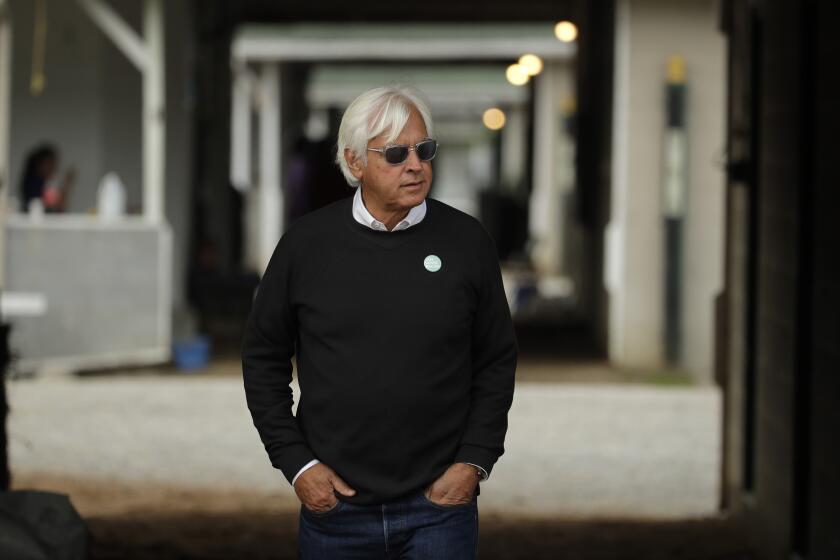Bob Baffert accepts 24-hour security with body cams, strict testing at Breeders’ Cup

- Share via
Bob Baffert is not only the most recognizable trainer in horse racing, he’s also the most scrutinized. As a condition of being allowed to run his horses in the Breeders’ Cup at Del Mar on Nov. 5-6, he has agreed to unprecedented screening, observation and testing, including security officers with body cams and abandoning usual withdrawal times for legal medications.
The move by the Breeders’ Cup comes in the wake of five medication violations in a year’s time, two of which were dismissed as being the result of contamination and one in which Baffert hasn’t been charged.
It’s the one in which charges haven’t been filed that has put Baffert in the crosshairs of two of the three big horse racing track operators, Churchill Downs Inc. and the New York Racing Assn.
Medina Spirit, the conditional winner of this year’s Kentucky Derby and scheduled to run in the Breeders’ Cup Classic, tested positive for betamethasone after running in the Derby. It’s a legal anti-inflammatory, but not legal on race day. Baffert contends that the colt was administered the medication in an ointment to treat a rash. The more common use of betamethasone is administered by intra-articular injection.
CDI then banned Baffert from its tracks for two years, which includes participation in the Kentucky Derby, and the New York Racing Assn. is seeking to ban him from its tracks. Baffert has been in litigation with NYRA and is awaiting a hearing in January. Baffert has not yet filed an action against CDI. The Kentucky Horse Racing Commission has yet to set a hearing date or charge Baffert.
Bob Baffert has cultivated the story of a horse racing dynasty built from humble roots. He now faces scrutiny about short cuts he’s alleged to have taken.
Baffert has accepted the security measures imposed by the Breeders’ Cup.
“We are happy to accommodate the transparency,” Baffert told The Times on Sunday. “We will care for our horses as we always do and any testing or observation is welcomed.”
The procedures, previously not made public but provided to The Times by the Breeders’ Cup, started last Wednesday in Baffert’s barn at Santa Anita. The Breeders’ Cup has in place a team of two investigators, three security officers and a Breeders’ Cup executive to watch Baffert’s barn on a 24-hour basis until the horses are shipped to Del Mar in the coming days.
Once the horses are moved, a security officer will be assigned to each of Baffert’s horses and will be equipped with body cams. Normally, body cams are not used and a single security officer watches two or three horses.
On Nov. 2, blood, urine and hair samples will be taken of all of Baffert’s prospective Breeders’ Cup runners to be followed by random collection during the week. Baffert has agreed to scratch any horse that tests positive for a legal but controlled medication even if it falls within the window for legal use. For example, betamethasone can be legally used if it is administered more than 14 days before competition. The period is known as withdrawal time.
Bob Baffert will be allowed to run his horses in this year’s Breeders’ Cup at Del Mar, but his thoroughbreds will undergo enhanced testing and protocols.
In addition, there will be investigators assigned exclusively to Baffert’s barn who will monitor it on a 24-hour basis and be allowed to confiscate medications and ointments and review daily treatment and billing records.
It’s unknown exactly how many horses Baffert will enter in the 14 Breeders’ Cup races until pre-entries are announced Wednesday.
In addition to Medina Spirit, Baffert is expected to enter Private Mission in the Distaff, Corniche in the Juvenile, Grace Adler in the Juvenile Fillies, and Gamine in the Filly and Mare Sprint.
Santa Anita, which has hosted 10 Breeders’ Cups and could possibly host again in 2023, has agreed to retain all surveillance footage of Baffert’s barn from Oct. 17 and provide it to the Breeders’ Cup, if asked. In addition, designated official veterinarians will have access to all treatment records for 60 days prior to the Breeders’ Cup races. The California Horse Racing Board requires records to be available for only 30 days.
All trainers with horses in the Breeders’ Cup receive more scrutiny than during regular racing, including testing and observation of every horse entered. The first four finishers also undergo postrace testing as well as horses that significantly underperform or others identified by the stewards.
Private Mission wins the Zenyatta Stakes for fillies and mares, giving Bob Baffert three winners in the first three days of the Santa Anita Fall Meeting.
These added measures apply only to Baffert.
The Breeders’ Cup would not disclose how it came to this agreement with Baffert, who was involved in the discussions or how its board of directors voted on the issue.
One other condition of this agreement is that Baffert must pay for all the added protocols and security.
As for the cost?
“I didn’t ask,” Baffert said.
More to Read
Go beyond the scoreboard
Get the latest on L.A.'s teams in the daily Sports Report newsletter.
You may occasionally receive promotional content from the Los Angeles Times.














